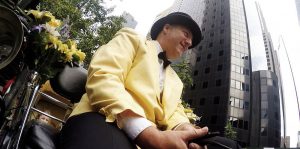
What do you do when the people you usually agree with on social issues and politics are out to destroy your livelihood? That’s one of the many questions raised by The Last Horsemen of New York, a documentary about the horse-drawn carriage drivers of New York’s Central Park and how they were almost put out of business by an unlikely alliance of animal rights activists and commercial real estate developers.
The film tells its story via carriage driver Christina Hansen, the spokeswoman for the drivers, who find herself and her fellow Teamsters (the drivers are unionized, and are literally among the last of the true Teamsters) at odds with New York Mayor Bill de Blasio. She admits midway through the film that she agrees with the progressive de Blasio on just about every other issue except when it comes to the one issue that is so important to her, her co-workers and the carriage service management.
As a candidate for mayor, de Blasio promised to shut down the Central Park carriages, in operation since the mid-19th century, on the grounds that the horses were being treated cruelly. A vocal contingent of animal rights supporters insist that the animals are manipulated like slave labor are kept in filthy conditions, worked without adequate rest and are subject to injury and death from exposure to city traffic.

“As a candidate for mayor, de Blasio promised to shut down the Central Park carriages…”
But behind the animal rights issue was a mayoral election and a small group of wealthy, powerful real estate developers who have their eyes on the exquisitely valuable property where stables for the horses are located.
Prior to running for the top city office, de Blasio had never expressed a strong opinion about the Central Park carriages, and the film speculates that real estate moguls with dollars signs in their eyes influenced the man who would occupy Gracie Mansion to push the animal rights agenda to advance the developers’ cynical goals.
Furthermore, the film alleges that developers staged a campaign to discredit the drivers and the company that runs the carriage service. Their aim was to put the carriage drivers out of business so that they could maneuver their way into taking over the horse stable property. To advance their goals they supported then-candidate de Blasio and hounded Christine Quinn, former Speaker of the New York City Council, who was also a candidate for mayor. Quinn did not support their efforts to end the carriage service, and she paid a price for it. De Blasio defeated her and went on to become mayor, although he had trouble keeping his campaign pledge to shut down the carriage service on his first day in office.

“…delivers a convincing argument…and reveals some unsettling facts…”
Not only are the mayor-elect’s campaign pledges held up to scrutiny, claims of animal mistreatment are investigated, and the cameras are brought into the stables to show that the horses are kept in clean conditions and are eating good food. Whatsmore, advocates for the drivers present data to the City Council demonstrating that the number of animal injuries caused by city traffic are greatly exaggerated and far from the serious problem animal rights activists have suggested.
The Last Horsemen of New York does a good job of making a case for the drivers, but underrepresents the opposing point of view — that might be due in part to the fact that the mayor seems to go to great lengths to avoid talking directly to the drivers, and likely was not available to offer any comments. What we do hear from the other side are shrill complaints of animal mistreatment that are not backed up with evidence.
In all, the film delivers a convincing argument in favor of the horse-drawn carriage industry and reveals some unsettling facts. Powerful real estate interests stood to make billions by shutting down a small business that adds historic and aesthetic value to the city and creates jobs. That’s a cause worth fighting for.

The Last Horsemen of New York (2018) Directed by Mary Haverstick. Written by Mary Haverstick. Starring Victor de Sousa, Christina Hansen, Mary Higgins Clark, Stephen Malone, and Liam Neeson.
7 out of 10
